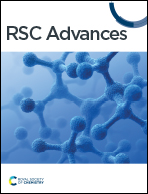Antimicrobial and antiviral evaluation of compounds from Holoptelea integrifolia: in silico supported in vitro study†
Abstract
Holoptelea integrifolia, also known as the Indian Elm Tree, has been used in Ayurvedic medicine for its medicinal properties. In this study, two biologically active metabolites, 5(6) dihydrostigmast 22en 3-O-β-glucoside (DHS) and 1-O-eicosanoyl glycerol-2′-O-β-galactouronic (EGG), were isolated for the first time from the n-butanol fraction of H. integrifolia using a chromatographic technique and identified by NMR, and HRESI-MS. The antiviral and multidrug-resistant activities of these metabolites were evaluated as well as the n-butanol fraction. The n-butanol fraction of H. integrifolia exhibited weak antiviral effects, but DHS and EGG demonstrated significant antiviral activity against herpes simplex type-1 (HSV-1) and Coxsackie (CoxB4) viruses. Both metabolites showed lower IC50 values than the standard antiviral drug acyclovir, indicating their potency in inhibiting viral replication. EGG showed potent antiviral activity with minimal cytotoxicity at the highest concentration tested, presenting a selectivity index (SI) of 18.18 and 15.58 against HSV-1 and CoxB4 viruses, respectively. A preliminary assessment of the antibacterial activity of the n-butanol fraction and metabolites revealed that DHS had the highest inhibitory potency against drug-resistant strains, including MRSA and Carbapenem-resistant Klebsiella pneumonia. It also exhibited significant inhibitions against Fluconazole-resistant Candida albicans and ESBL – Escherichia coli. DHS displayed the lowest minimum inhibitory concentration (MIC) values, indicating its superiority as an antibacterial agent compared to EGG and the n-butanol fraction. Molecular docking analysis confirmed the antiviral and antibacterial actions of DHS and EGG by demonstrating their strong binding.



 Please wait while we load your content...
Please wait while we load your content...